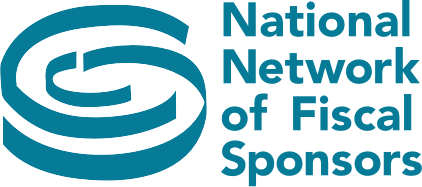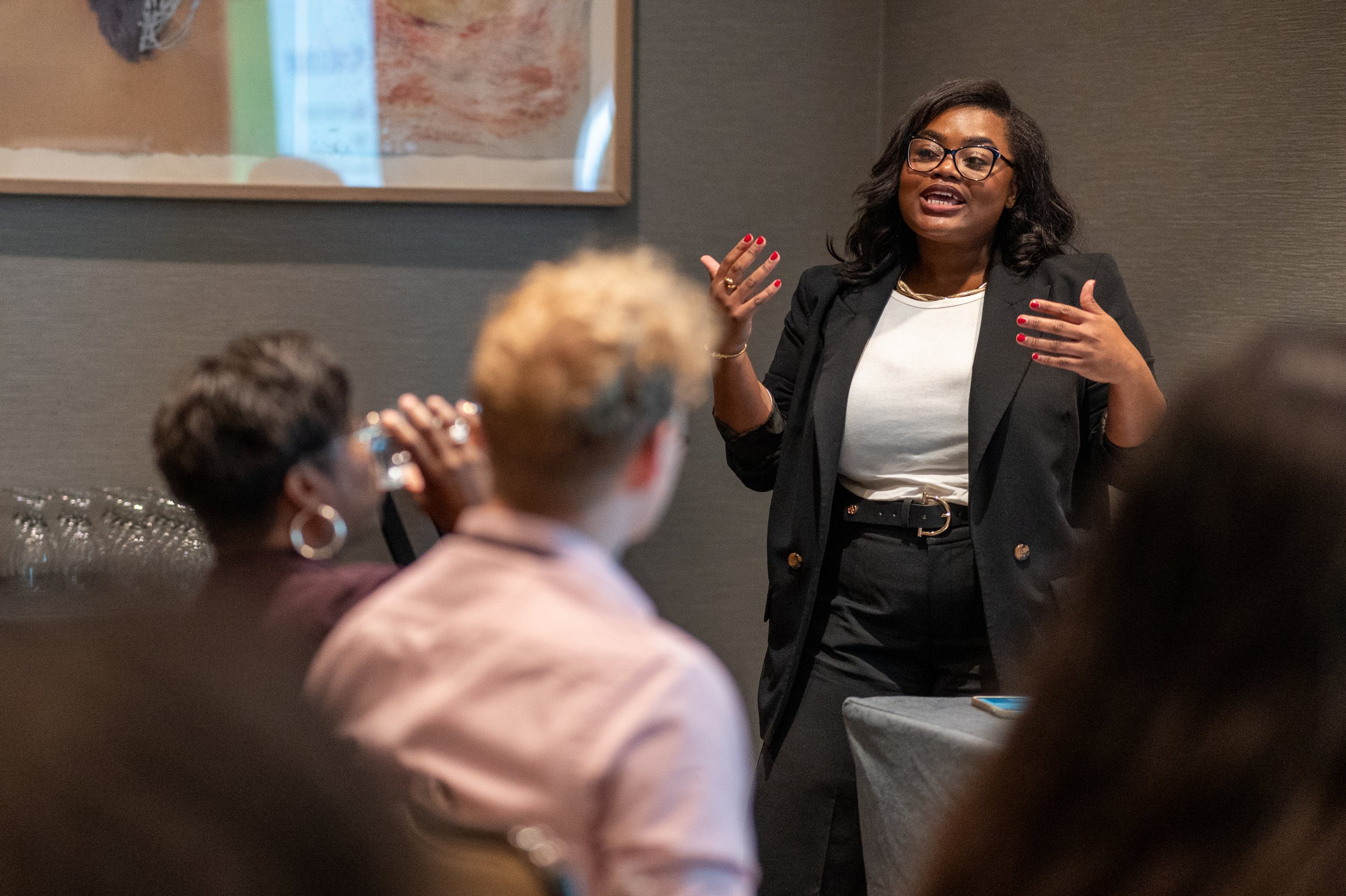Network Exchange: Improving office culture
Network Exchange: Louisa Mfum-Mensah and Thembi Maiden of Urban Affairs Coalition on improving office culture
Have you checked out Network Exchange, the podcast from the National Network of Fiscal Sponsors? Whether you’re a seasoned professional, new to the field, or just curious about the work, this show is your go-to source for illuminating insights, best practices, and the latest trends in the dynamic realm of fiscal sponsorship.
To give you a sense of what we’re discussing on the podcast, here’s an excerpt from a recent conversation with Louisa Mfum-Mensah and Thembi Maiden from the Urban Affairs Coalition (UAC), a fiscal sponsor with 486 employees that has recently put a lot of effort into strengthening its workplace culture. That process inspired a panel at the 2023 National Gathering in New Orleans.
This conversation has been edited for brevity and clarity.
Lee Stabert: Can you please introduce yourself and just tell us a little bit about what you do and how you got into fiscal sponsorship?
Maiden: My name is Tembi Maiden. I'm the Director of Talent Operations for UAC. Fiscal sponsorship wasn't ideally what I was looking for. It was more of the nonprofit aspect and the work that was being done in the community. That was how I discovered UAC and the work that they did.
Mfum-Mensah: I'm Louisa Mfum-Mensah. I am the vice president of partner experience for UAC. Like Tembi, fiscal sponsorship was not really on my radar. About 12 years ago, I worked for a program that was fiscally sponsored by UAC, and it really helped me understand the power and the value of fiscal sponsorship, and its ability to bolster and support smaller organizations.
Can you talk about UAC? How would you describe the work you do? What distinguishes you from other organizations in the National Network of Fiscal Sponsors?
Mfum-Mensah: UAC is the oldest and largest Black-led fiscal sponsor in the nation. What makes us really unique is that we are so deeply rooted and embedded in Black and brown communities in Philadelphia. We're approaching the work of fiscal sponsors with a lens that's a bit more culturally competent, really understanding some of the challenges and the struggles that those organizations face and doing our best to advocate for them. We also help them navigate some of the red tape and hurdles that exist with running a nonprofit.
Maiden: People ask me, “What is fiscal sponsorship?” My simplest answer is that we take care of the back-office work so that people can do the grassroots work of the community, which is the bigger picture. They can make their ideas come to life because we're handling things for them.
“We're approaching the work of fiscal sponsors with a lens that's a bit more culturally competent, really understanding some of the challenges and the struggles that those organizations face and doing our best to advocate for them.“
– Louisa Mfum-Mensah
So the inspiration for this conversation and the reason why we wanted to have the two of you on the podcast was because of a panel that you put together at the 2023 National Gathering in New Orleans. This panel was called “Baggage Claims: Cultivating Healthy and Authentic Work Environments.” What inspired you to put this panel together?
Mfum-Mensah: Here at UAC, I have been tasked with navigating culture and a culture change within the organization. About three years ago, UAC decided to become very intentional about the feel of being part of this coalition — what it felt like for organizations and what it felt like for staff members. We've seen some good progress for our staff in just the way that folks relate to each other and connect with each other.
And we feel like the challenges that we've experienced as an organization are not something that's unique to UAC. I'm sure many other fiscal sponsors are experiencing the same thing. We wanted to share what we've learned and some of the changes that we've been incorporating here.
So let's drill down. What were the issues you were seeing in your workplace?
Mfum-Mensah: We ask people to give a lot to the communities we serve. We asked staff members to go above and beyond on a daily basis — to answer their phone sometimes after hours to problem solve or troubleshoot an issue. But, internally, we are not necessarily always doing our part to support and care for our teams. And because we weren't doing our part, you see the tensions internally between different teams and different individuals.
So sometimes the ball gets dropped. This is part of the reality of being human. But instead of having an environment where folks come together and collaborate to solve those problems, it becomes a little bit of a blame game. It just was not conducive to the environment that we wanted to have here, and it really wasn't productive to our ultimate mission. We had to take a step back and really ask ourselves, what are we doing to contribute to this as a tension point? And when I say “we,” I mean our entire leadership team — the ones who are really steering and guiding the organization.
“[Practices of coming together as a team]… It's an opportunity for us to see our teams, who are remote, and check in on them. Like, How are things going over there? What are you up to? And it became another way for us to engage each other.“
– Thembi Maiden
Office politics is something everyone can relate to. This stuff is really hard to fix. What were some of the things that you actually were able to put into place that were impactful?
Mfum-Mensah: One of the first things that really helped us was launching a “Team Canvas” that we would fill out as teams on a quarterly basis. It's a tool where you basically sit down with your team and establish the norms and the rules for engagement with each other, and also identify your goals and priorities as a team. People were able to share how they'd like to be communicated to and communicated with, and come to agreement about how they want to navigate conflict.
Conflict is a part of every element of working with individuals, but being able to sit down in a season when everybody is relatively at peace to say, Hey, when things get a little rough, let's, say, take five minutes to reflect on questions before we answer them. Or we want you to send an email with your concern as opposed to calling me because I process better this way and it allows me to be better in my communication back to you.
Maiden: More than policy changes, it was the practices and the way we were coming together. So we started doing daily huddle meetings where departments met each morning for a half an hour and talked through their priorities or if there was something team members needed assistance on.
So those meetings helped. And then we started to do biweekly “all hands” virtual meetings. It's an opportunity for us to see our teams, who are remote, and check in on them. Like, How are things going over there? What are you up to? And it became another way for us to engage each other. And then quarterly, we started to host a town hall meeting — everybody comes in and we get to actually physically see each other. Those meetings have changed the way people receive information.
To hear about how these changes at UAC informed the pair’s panel at the National Gathering, the upsides of collaboration, and more tips for cultivating a healthy and authentic work environment, listen to the full episode!
This podcast was produced by the National Network of Fiscal Sponsors. To learn more, please head to fiscalsponsors.org. Make sure you subscribe wherever you listen to podcasts. If you'd like information on the recently announced 2024 National Gathering in Atlanta, visit fiscalsponsors.org/events.




